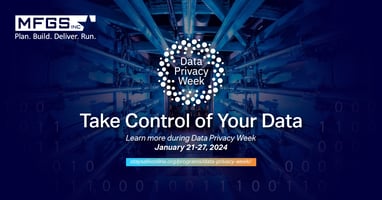Cybersecurity Awareness Month is the perfect time to spotlight one of the most pressing...
Artificial Intelligence in Action with MFGS, Inc.
The current state of Artificial Intelligence (AI) has seen impressive advancements in recent years and has tremendous potential to revolutionize and transform government services. Realizing AI's full potential will require sustainable investments in data readiness, skilled expertise, and robust governance frameworks. But when implemented effectively, AI has already proven itself and can indeed revolutionize government operational efficiency and how services are delivered.
Specifically for the U.S. Department of Defense (DOD), AI has the potential to revolutionize military operations and significantly improve mission outcomes in several key areas including Intelligence Surveillance and Reconnaissance (ISR), Mission Planning and Decision Support, and Autonomous Systems and Unmanned Platforms, Cyber Operations and Security, and Preventive Maintenance and Readiness. In these cases, AI is a force multiplier, enhancing decision dominance, operational efficiency, and military superiority.
Artificial Intelligence Technologies and Techniques
MFGS, Inc., as the exclusive authorized supplier of OpenText products to the U.S. federal government agencies and their partners, is already helping government customers realize the benefits of AI and has a well-established history doing so. The product portfolio employs various AI technologies and techniques, including:
- Machine Learning / Deep Learning — Supervised and unsupervised machine learning algorithms like neural networks are utilized for tasks like text classification, entity extraction, predictive analytics etc.
- Natural Language Processing (NLP) — NLP capabilities like named entity recognition, sentiment analysis, topic modeling are leveraged to allow insights from unstructured text data.
- Computer Vision / Image Recognition —Computer vision techniques are used for intelligent document capture, image classification and processing.
- Knowledge Graphing —Knowledge graphing maps connections and relationships across disparate enterprise data sources.
- Robotic Process Automation (RPA) — Process automation solutions combine RPA with machine learning models for automating repetitive tasks.
- Conversational AI — Integrated conversational AI assistants use NLP to enable interactive services like end-user support.
And the list continues. With 371+ AI-specific patents and counting, it’s no wonder OpenText is a leader in enterprise-ready AI solutions.
By leveraging these AI capabilities tuned for public sector and national defense use cases around information governance, process automation, end-user services, and cybersecurity, the department and components can drive innovative digital transformation priorities while ensuring data governance and security.
Improving Mission Outcomes and Operational Effectiveness
Beyond just the AI capabilities, solution offerings by MFGS, Inc. can measurably improve mission outcomes and operational effectiveness. Here are just a few ways:
- Enhanced Mission Readiness and Decision Support — By applying AI-powered analytics on vast amounts of data from multiple sources, services and components can gain faster insights to make better decisions aligned with mission priorities. For example, AI models can analyze intelligence data, simulate scenarios, and provide real-time recommendations to support national security missions.
- Optimized Resource Allocation and Forecasting — AI can help optimize allocation of limited budgets and resources by predicting future demands and identifying inefficiencies. For example, applying AI to analyze historical trends, financial data, and war-fighter needs can lead to better resource planning for services delivery.
- Proactive Risk Mitigation and Fraud Prevention — AI allows proactive monitoring and mitigation of risks by quickly detecting anomalies and potential threats. Computer vision, NLP, and machine learning can automatically identify fraudulent and risky patterns in applications, claims, or procurement activities to reduce losses.
- Accelerated Innovation and Mission Responsiveness — AI-driven process automation can free up operator/analyst personnel from repetitive tasks, allowing them to focus on more complex analysis and decision making to drive improvements and respond faster to evolving mission needs.
- Improved War-fighter Trust and Engagement — Intelligent virtual assistants, personalized services, and AI-powered monitoring can enhance end-user experiences, build trust, and provide quick access to the services and information at the time they are needed.
MFGS, Inc. and our partners stand ready to help organizations carefully prioritize and implement AI use cases that directly address unique mission goals, whether it’s warfighting, national security, healthcare, support services, public safety, IT/cyber ops, or other areas of responsibility. Setting measurable objectives like cost savings, productivity gains, and risk reduction will quantify the mission impact and help define the success criteria.
Don’t wait, let’s collaborate! Get started the right way and leverage industry-leading solutions to ensure maximum mission impact. Contact us at sales@mfgsinc.com or reach out directly to me or your MFGS, Inc. account executive to start the conversation.





